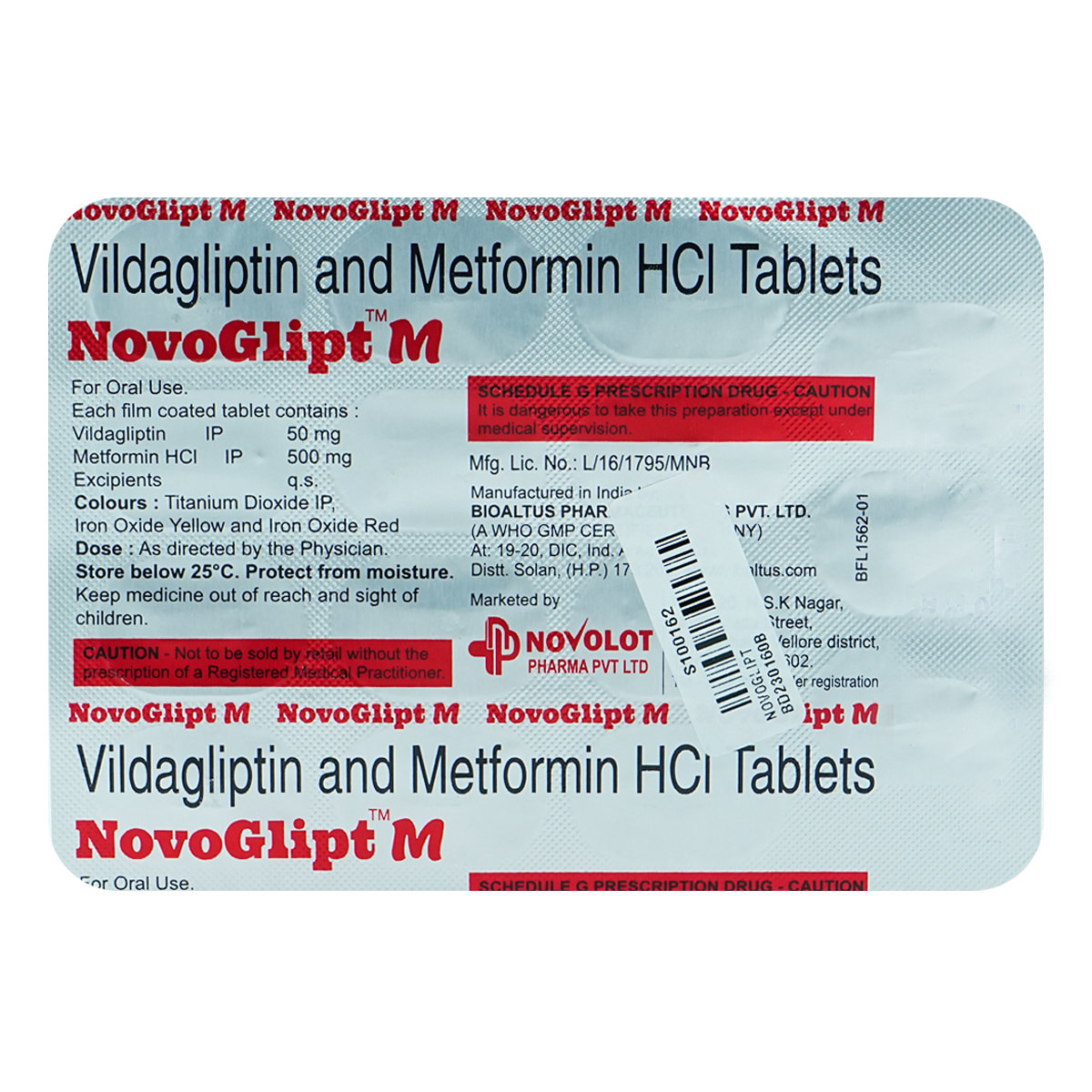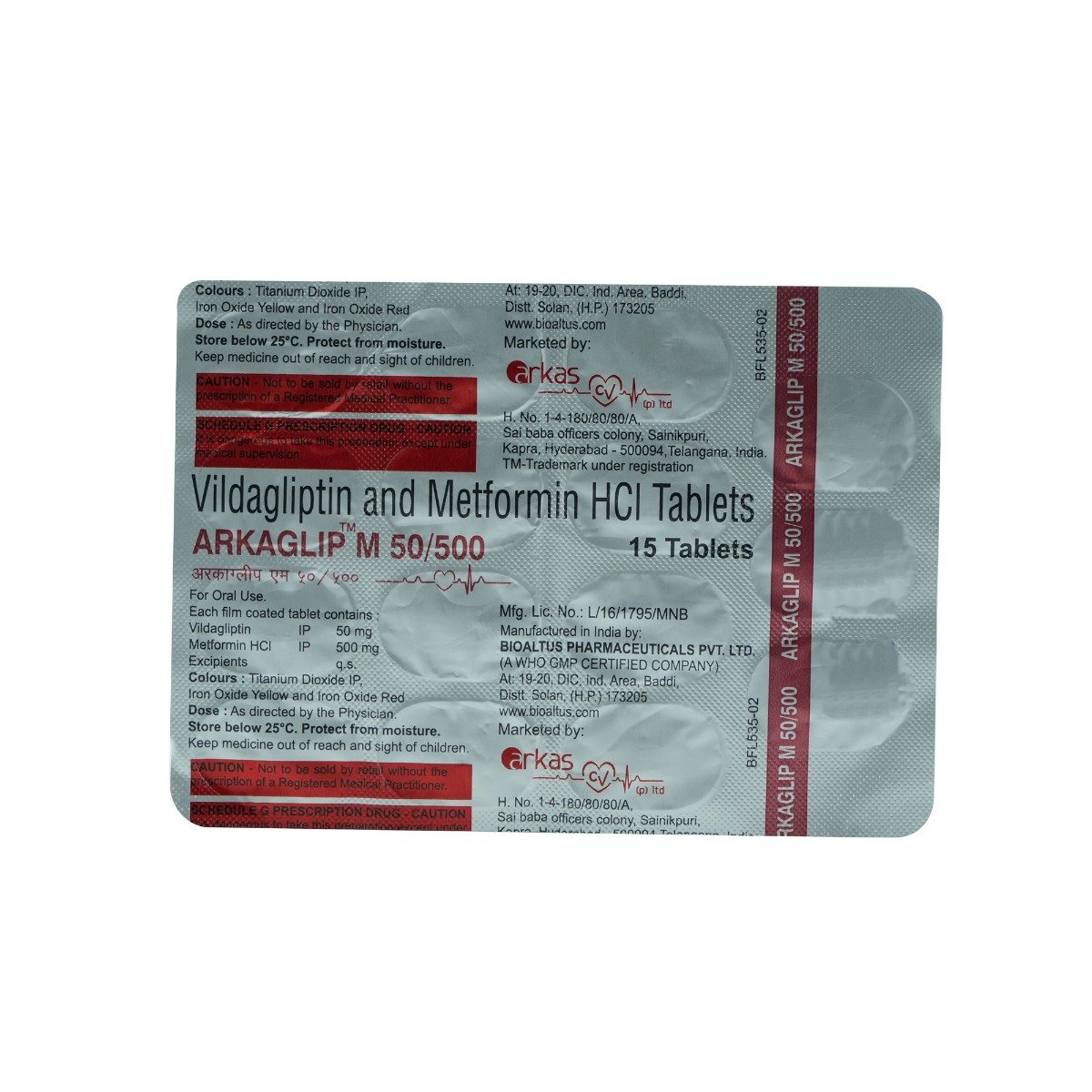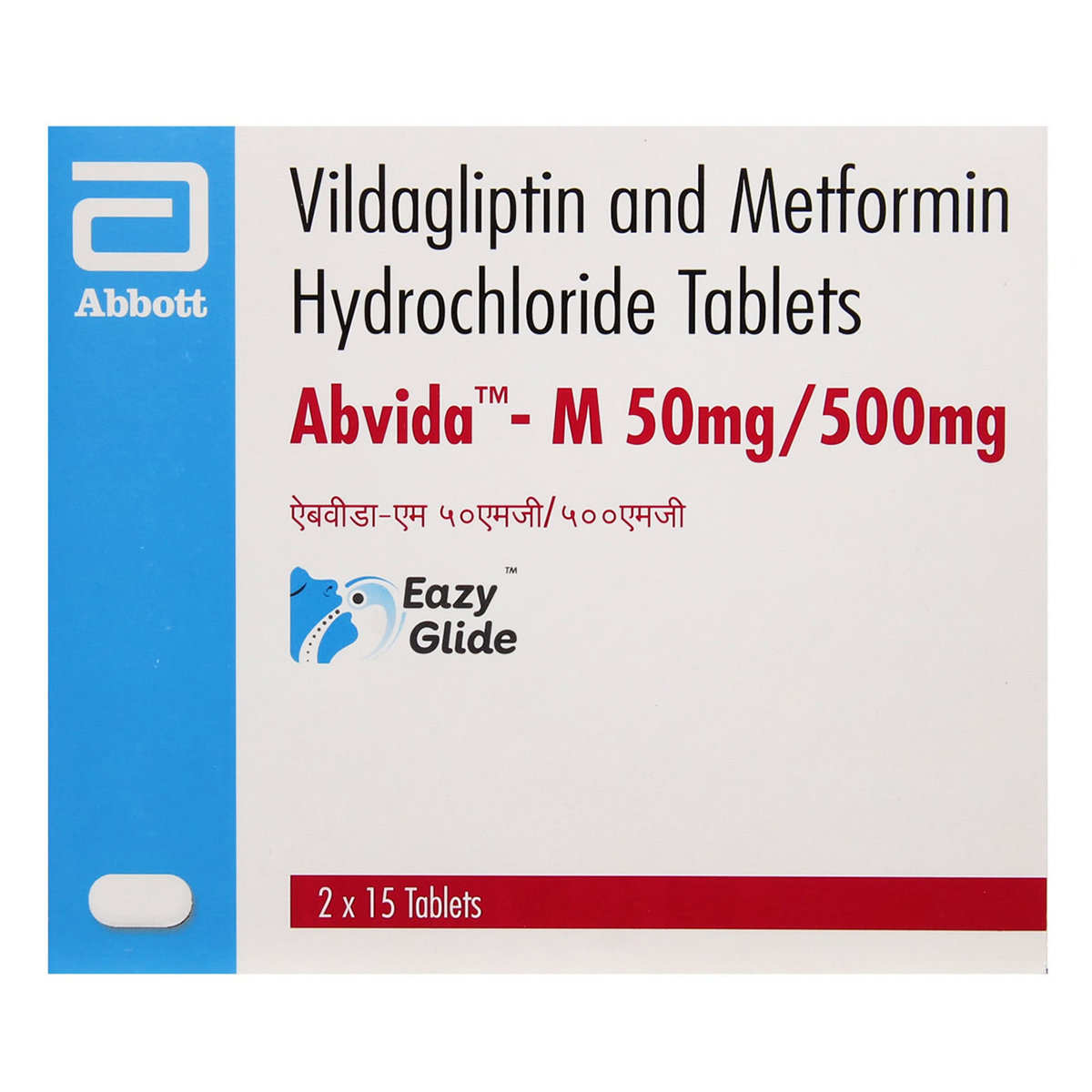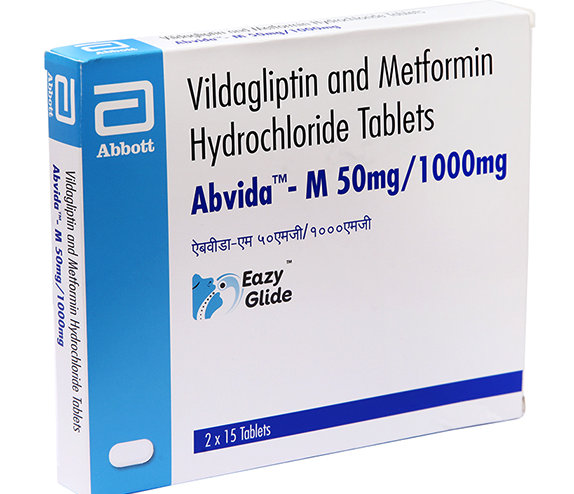Metformin+vildagliptin
About Metformin+vildagliptin
Metformin+vildagliptin is a combination drug of Vildagliptin (DPP-4 inhibitor) and Metformin (Biguanides) belongs to the class of anti-diabetic. Type 2 diabetes mellitus used to be known as 'non-insulin-dependent diabetes mellitus (NIDDM)' or 'maturity-onset diabetes. Type 2 diabetes develops if the body does not produce enough insulin or when your body's insulin does not work as well as it should. It can also develop if the body produces too much glucagon. Insulin is a substance which helps to lower the level of sugar in your blood, especially after meals. Metformin+vildagliptin is another substance which triggers the production of sugar by the liver, causing the blood sugar to rise. The pancreas makes both of these substances.
Metformin+vildagliptin helps to control the blood sugar level. It works by making the pancreas produce insulin and less glucagon (effect of vildagliptin) and also by helping the body to make better use of the insulin it has (effect of metformin). You must continue following the diet and exercise recommended for you whilst on treatment with Metformin+vildagliptin. Metformin+vildagliptin is not a substitute for insulin. It is not used to treat type 1 diabetes (where your body does not produce insulin) or diabetic ketoacidosis.
Metformin+vildagliptin should be taken with food to avoid an upset stomach. Metformin+vildagliptin should be taken at the same time of the day each time for best results. For better advice, your doctor will decide what dose should be taken, which can change quickly depending on your condition. The most common side effect of Metformin+vildagliptin is hypoglycemia (low blood glucose levels) characterised by dizziness, sweating, palpitations, hunger pangs, dry mouth and skin etc. So, to avoid hypoglycemia, you should not miss meals and also should carry some form of sugar along with you. Other side effects include taste change, nausea, diarrhoea, stomach pain, headache, and upper respiratory symptoms.
Metformin+vildagliptin should not be stopped even if you feel better without consulting your doctor as sugar levels change. If you stop taking Metformin+vildagliptin abruptly, it may increase your sugar levels which could further increase the risk of eyesight loss (retinopathy), kidney (nephropathy) and nerve damage (neuropathy). Metformin+vildagliptin should not be taken if you have type 1 diabetes mellitus or severe kidney or liver disease. Please inform your doctor if you have any heart disease or planning to get pregnant or breastfeed.
Uses of Metformin+vildagliptin
Medicinal Benefits
Metformin+vildagliptin helps your pancreas produce more insulin, effectively utilise insulin, and decrease the excess sugar that your liver makes. It helps control the rise of blood sugar levels in your body after a meal. Metformin+vildagliptin plays a vital role in controlling blood sugar levels and prevents serious complications of diabetes like eyesight loss (retinopathy), kidney (nephropathy), nerve damage (neuropathy), diabetic foot ulcer and delayed wound healing.
Directions for Use
Storage
Side Effects of Metformin+vildagliptin
- Low blood sugar
- Nausea
- Headache
- Shaking or quivering
- Vomiting
- Diarrhoea
- Abdominal pain
- Loss of appetite
- Joint pain
- Tiredness
- Constipation
- Swollen hands
- Ankle or feet (oedema)
Drug Warnings
Metformin+vildagliptin should not be used in patients with type 1 diabetes or with diabetic ketoacidosis. Some diabetic patients, while taking Metformin+vildagliptin, might develop a rare but serious condition called lactic acidosis. In this condition, there is too much lactic acid accumulated in the blood that can damage the working of your liver and kidney required for the elimination of excess lactic acid from the blood. Before you start taking Metformin+vildagliptin, tell your doctor if you’ve ever had pancreatitis (inflammation of the pancreas), kidney disease, and low vitamin B12 level. Metformin+vildagliptin, when used with insulin, may extremely lower the blood sugar level leading to hypoglycaemia condition, which can be fatal. In this case, your doctor may adjust the dose by lowering the dose of insulin or Metformin+vildagliptin. Prolonged intake of Metformin+vildagliptin may lower your thyroid-stimulating hormone (TSH); hence, an annual check-up of TSH is recommended. In rare cases, you may also develop a serious skin reaction known as bullous pemphigoid that requires immediate medical attention. Tell your doctor if you are going to have a diagnostic test with an injection of dye or X-ray contrast agent. The use of Metformin+vildagliptin should be stopped for a short time before having an X-ray procedure.
Drug Interactions
Drug-Drug Interactions: Metformin+vildagliptin interacts with pain killers (aspirin, ibuprofen, and celecoxib), high blood pressure-lowering pills (nifedipine, captopril, enalapril, lisinopril), thyroid hormones (thyroxine), antacid (cimetidine) or certain medicines affecting the nervous system.
Drug-Food Interactions: Intake of excessive alcoholic beverages may increase the chance of life-threatening condition known as Lactic Acidosis. So, avoid intake of alcoholic beverages with Metformin+vildagliptin.
Drug-Disease Interactions: People affected with heart diseases (like congestive heart failure and myocardial infarction), vitamin B12 deficiency, and alcoholism should avoid intake of Metformin+vildagliptin.
Drug-Drug Interactions Checker List:
Safety Advice

Alcohol
unsafeIt is best to avoid alcohol while taking medication.

Pregnancy
cautionPlease consult your doctor for advice before using Metformin+vildagliptin.

Breast Feeding
cautionPlease consult your doctor for advice before using Metformin+vildagliptin.

Driving
cautionDrive only if you are physically stable and mentally focussed, If you experience drowsiness after taking these medications you should not drive or operate any machinery or vehicles.

Liver
cautionIf u have or had history or evidence of any liver-related diseases, please consult the doctor before taking the medicine.

Kidney
cautionIf u have or had history or evidence of any kidney-related diseases, please consult the doctor before taking the medicine.

Children
cautionIt is advisable to consult a doctor before using it.
Habit Forming
Diet & Lifestyle Advise
- Fill your half plate with starchy veggies, a quarter with proteins, and a quarter with whole grain.
- Eat at regular intervals. Do not take a long gap between a meal or snack.
- Monitor your blood sugar level regularly, especially when there are lots of fluctuations.
- Invest at least 150 minutes of moderate-intensity physical activity or one hour and 15 minutes of high-intensity exercise weekly.
- Lose weight gradually to achieve a healthy body mass index (18.5 to 24.9).
- Replace refined carbohydrates-containing foods with whole grain foods and increase the intake of fruits, veggies, and other fibre-enriched foods.
- Limit saturated fat (or hidden intake fats) in food like chips, crisps, pastries, biscuits, and samosas. Choose omega-3 fatty acid-containing oils for daily cooking. For frying, you can use palm oil, mustard oil, groundnut oil, rice bran oil, and safflower oil.
- Do not take stress as it may elevate your blood sugar level. You can adopt stress management techniques like mindfulness to control stress-related blood sugar changes.
- Opt for low-fat dairy products (low-fat yoghurt, fat-free milk, cheese, etc.).
- Keep your blood pressure as normal (140/90) as possible as it reduces the risk of cardiovascular diseases in diabetes patients.
Special Advise
Contact your doctor immediately if you have nausea, vomiting, kussmaul breathing (laboured and deep), and generalised weakness which are symptoms of Lactic acidosis, a very rare but serious metabolic complication.
Patients Concern
Disease/Condition Glossary
Type 2 diabetes is a condition where the body is unable to make sufficient insulin, or the insulin that it makes doesn't work properly or is utilized by our body. This can cause high blood sugar levels (hyperglycaemia). Symptoms of type 2 diabetes include increased thirst, frequent urination at night, slow wound healing, increased hunger, fatigue, and blurred vision. There may be weight gain in some cases, while in rare cases, weight loss may be observed. The complication of type 2 diabetes also includes neuropathy (nerve problems), nephropathy (kidney problems), retinopathy (damaged retina of eyes or blindness), loss of limbs, sexual dysfunction, and an increase in the chance of heart attack or stroke.
FAQs
If you have symptoms like increased hunger, increased thirst, frequent urination (usually at night), unexplained weight loss, fatigue, blurred vision, slow wound/sores healing, and frequent infections, contact doctor as it can be a condition of type 2 diabetes.
In case you feel that your blood sugar level is going down and you are feeling weak, immediately eat sugar candies or drink sugary beverages. It will help to balance the blood sugar level in your body. So, it is advisable to keep sugar candies with you.
No. Metformin+vildagliptin is only prescribed for the treatment of type 2 diabetes also called as 'non-insulin-dependent diabetes'.
Type 2 diabetes is a common form of diabetes in which the blood sugar-lowering hormone called insulin produced by the body does not function properly. Due to this, the blood glucose level increases, and symptoms such as frequent urination, increased thirst, and increased hunger start. Diabetes, if left untreated or not treated properly, can cause long-term complications such as nerve damage, kidney damage, eye damage, foot problems, and also poses a high risk of developing heart diseases.
Metformin+vildagliptin help to control the level of sugar in the blood. The substance vildagliptin works by making the pancreas produce more insulin and less glucagon. The substance metformin works by helping the body to make better use of insulin. This medicine has been shown to reduce blood sugar, which may help to prevent complications from your diabetes.
Continue taking your medicine for as long as your doctor tells you to. Your doctor will check your progress to make sure the medicine is working and will discuss with you how long your treatment should continue. Do not stop taking Metformin+vildagliptin unless your doctor tells you to.






